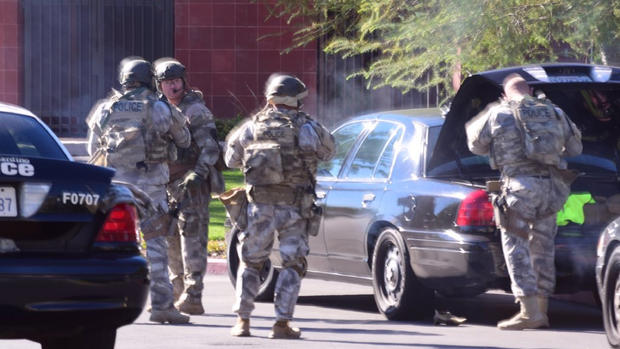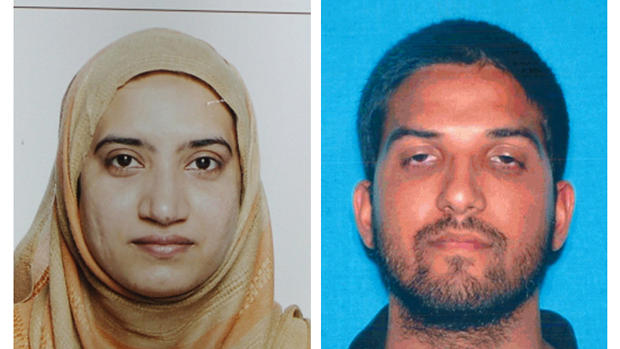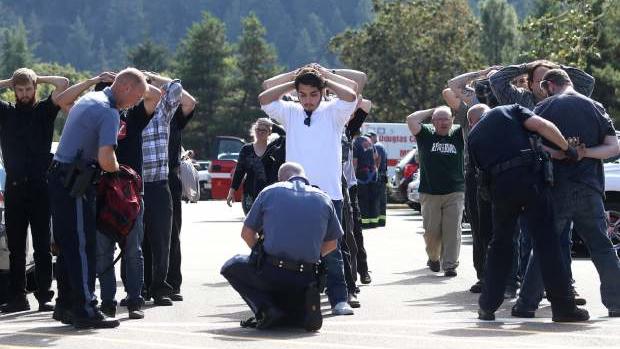Official: Gunman may have talked about attack years ago
The FBI is investigating information that San Bernardino gunman Syed Farook talked about a violent attack as far back as 2011, a U.S. official told CBS News Wednesday.
At this point, it isn't known how serious Farook was or whether the attack was just aspirational. Officials were trying to determine the authenticity of the evidence, but they were actively investigating the development, the official told CBS News.
Investigators were also looking at evidence that Farook and Enrique Marquez, his longtime friend who purchased the two assault rifles used in the San Bernardino attack, discussed a weapons purchase around the same time, the official told CBS News.
Marquez has been undergoing questioning by the FBI and other officials.
CBS News has also learned that Marquez is related to the Farooks through marriage. He married the sister of Farook's brother's wife. The Farooks and Marquez were neighbors for years, but he married into the family last year. The women are Russian.
Farook and his wife, Tashfeen Malik, were radicalized at least two years ago and had discussed jihad and martyrdom as early as 2013, one year before they married, FBI Director James Comey said Wednesday.
Comey told the Senate Judiciary Committee that investigators believe that Farook and Malik were radicalized even before they began their online relationship and that Malik held extremist views before she arrived in the U.S. last year.
He told the panel that the two "as early as the end of 2013 were talking to each other about jihad and martyrdom before they became engaged and married and were living in the U.S."
The disclosure means that Malik's radicalization had already begun when she applied for a visa to come to the U.S. to get married, and that the government's vetting process apparently failed to detect it. Comey said he didn't know enough to say whether weaknesses in the visa process enabled her to enter the U.S.
Also on Wednesday, the father of Malik said he condemns and regrets his daughter's action and the killings in San Bernardino.
Gulzar Ahmad Malik spoke to The Associated Press by telephone from Jiddah, Saudi Arabia. He says he is "very, very sad... I am in such pain that I cannot even describe it."
Gulzar Ahmed Malik has been a resident in the kingdom since the early 1980s, the Saudi Interior Ministry says.
Malik came to the United States in July 2014 from Pakistan after being approved for a K-1, or fiancee visa. Homeland Security Secretary Jeh Johnson has said the Obama administration is now reviewing the program. He did not say what changes were being considered.
Malik married Farook the following month. Farook was born in Chicago in 1987 and raised in southern California.
FBI officials had previously said that the couple had been radicalized for "quite some time," but the disclosure Wednesday was the most specific yet about the timeline of their relationship and progression toward extremism.
Comey said the couple was clearly inspired by a foreign terror organization, but that investigators did not yet know whether their online courtship was arranged by such a group or developed naturally on its own.
"It would be a very, very important thing to know," he said.
The FBI director described the couple as an example of homegrown violent extremists who appear to have radicalized "in place," drawing a distinction between the San Bernardino attack and the one last month in Paris that officials suspect involved planning and training in Syria.
Comey declined to say what role, if any, encrypted communications played in last week's massacre.
Though he said the Obama administration was not seeking to address concerns over data encryption on smartphones, he said he remained concerned that criminals, terrorists and spies were using such technology to evade detection.
"Increasingly, we are unable to see what they say, which gives them a tremendous advantage," he said.
He said one of the gunmen in last May's shooting outside a Prophet Mohammed cartoon contest in Garland, Texas, had exchanged more than 100 messages prior to the attack that investigators still had been unable to access.



